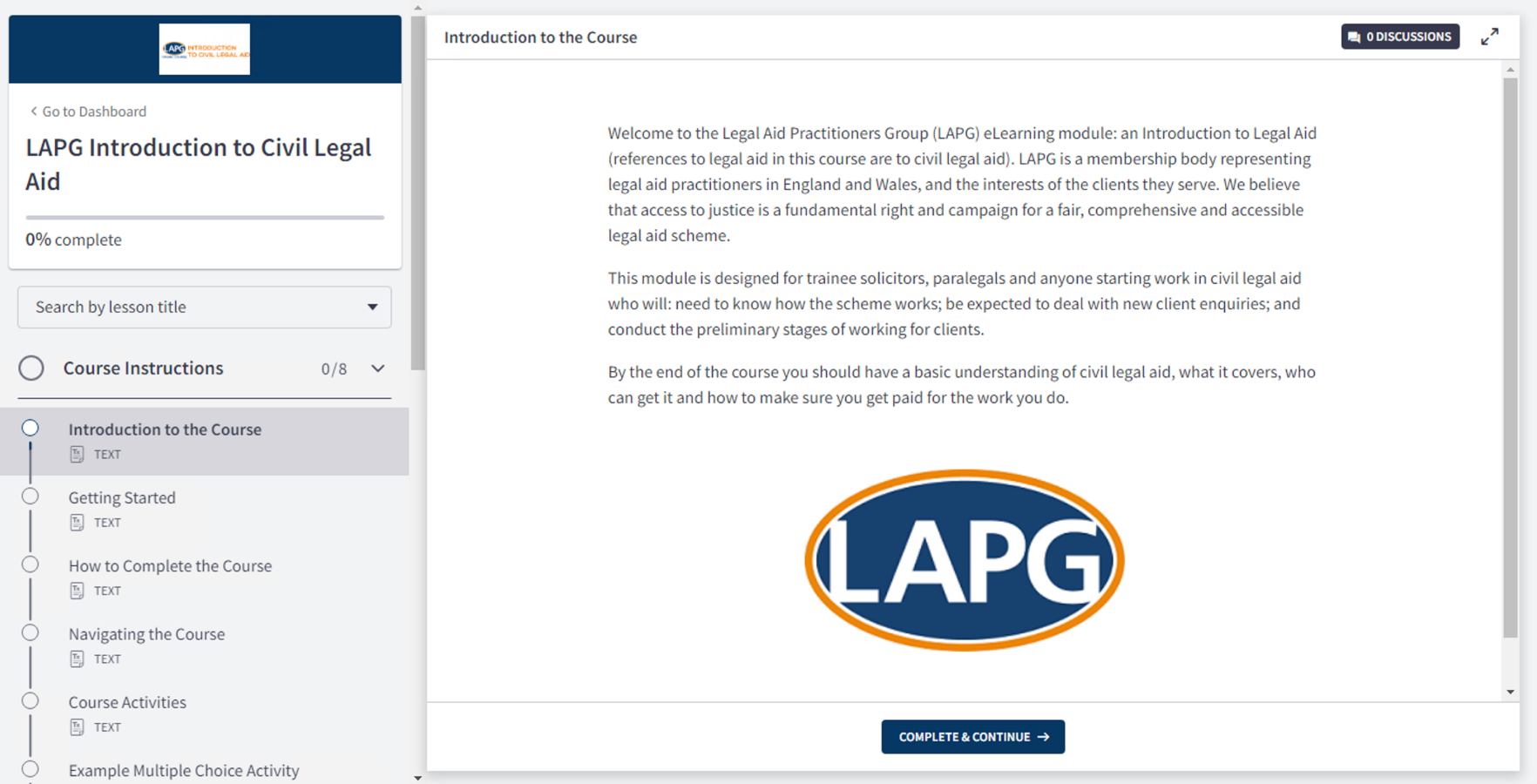
The Civil Legal Aid scheme is incredibly complex and the consequences of getting something wrong can be damaging to a client’s case or financially damaging to the organisation doing the work – sometimes both.
LAPG receives numerous member enquiries every month, many of which indicate
- A lack of understanding of the detail of the legal aid scheme and
- The difficulties practitioners face in maintaining a working knowledge of the scheme, as it changes regularly.
Our members often tell us that they would like to have access to a modular ‘Introduction to Legal Aid’ training programme taking newcomers to the sector through the potential minefield of legal aid work that they can use as a standard part of their internal training process for new recruits.
We developed the first module in a series which provides a general introduction to the civil legal aid scheme aimed at trainees, paralegals, junior lawyers and those that wish to refresh their knowledge having worked in the sector for some time.
It is an online self-study modular course online that you complete at your own pace, with external links for up to date Legal Aid Agency information.
A number of organisations are now using this course as a standard part of their training process for new recruits
This course provides a comprehensive overview and introduction to the Civil Legal Aid scheme and the critical aspects of working within a legal aid contract.
In this introductory module we cover:
• Where the legal aid scheme and rules can be found
• The differences between Legal Help and Legal Representation
• The legal and financial tests applied in determining eligibility for legal aid
• The different forms of service available
• How to get legal aid in an emergency
• Rules on the statutory charge, costs protection and Exceptional Case Funding
The course has been developed by LAPG and tested by members of the LAPG Advisory Committee, members of the Young Legal Aid Lawyers (YLAL) and other legal aid practitioners.
Cost: £99 per person for LAPG members (in some cases, we offer discounted or free places for members of the Justice First Fellowship. Please, contact us for further details) and £125 per person for non-members.
We are now accepting subscriptions and online payments through our Training Platform. You can subscribe here.
Should you have difficulties with the payment, please do contact our Learning & Development Co-Ordinator Andrea Shumaker
We are going to design more modules, and are very happy to hear from you with feedback on how to improve this course and ideas for future course areas.
Is this course online or in person?
This course is entirely online and the content is self-paced. You can complete the course at your own pace as there are no live elements.
How long do I have access to the course?
You will have access to the course for 12 months from the date you sign up. If you complete the course, you can continue to reference the material as you work through cases until your access expires.
How do I access the course?
If you sign up via Thinkific, you will access the course using the same details you entered when purchasing the course. Please make sure that you enter the correct details when purchasing the course. If you sign up with Andrea (andrea.shumaker@lapg.co.uk), she will create your account for you and provide you with a sign-in link. Moving forward you will need to log-in via Thinkific with your details to access the course.
How long does it take to complete the course?
The course can be completed as quickly or as slowly as you wish. You can get through the content in a day or you can spread it out over a longer period of time, it is completely up to you!
What if I need an invoice?
We are unable to provide an invoice for transactions made on Thinkifc. If you need an invoice, please email andrea.shumaker@lapg.co.uk to arrange your booking. If you have already purchased through Thinkific and need an invoice, please email Andrea at the above email.
We use Thinkific: Effective, engaging and easy to use.
Comments from delegates
‘The course was easy to use and follow.’
‘Good, logical structure’
‘It was a useful refresher on completing means and merits assessments for Legal Aid cases.’
‘It was easy to navigate and clear to understand.’
‘We haven’t been offered anything like this before- we were all pleased to see that this course had been offered as its useful for all legal aid solicitors, no matter what level. It’s good to go back to basics.’
‘I think for beginners to legal aid, it is perfect.’
‘It was a refresher course which was very helpful.’
‘To understand the different types of funding available other than certificated matters.’
‘Very useful in improving my understanding of the subject.’


